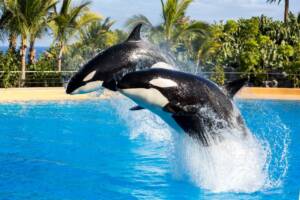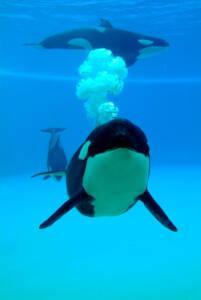A recent study, funded by the Loro Parque Foundation and initiated with the orcas of Loro Parque, has made it possible to determine the personality structure of cetaceans. Recently published in the Journal of Comparative Psychology, it’s a pioneering project, as it’s the first time in history that the personality of these animals has been studied.
Dr. Javier Almunia, Director of the Loro Parque Foundation, explained that “personality studies in animals help us to better understand their behaviour and, in the short term, can be related to measures to improve their welfare”. In addition, he pointed out that “a detailed knowledge of an animal’s personality allows us to individualise, for example, an environmental enrichment or its social relations, so that they adapt much better to its needs and preferences”.
In order to obtain greater statistical validity of the results, the project analysed a total of 24 orcas (housed not only in Loro Parque, but also in SeaWorld Orlando and SeaWorld San Diego). In order to determine their personalities, a questionnaire was applied consisting of 38 adjectives, based on another used in humans: the ‘Five Factor Model’. An average of 20 evaluators per centre, mainly trainers with an median of eight years experience with the animals, evaluated all the adjectives for the study sample.
“The most relevant part of the research is that it’s the first time that the personality structure of a cetacean has been obtained. In recent years, a large number of personality studies have been carried out on a wide range of animals – including invertebrates, insects and fish – but curiously in cetaceans, personality studies had only been carried out on bottlenose dolphins, focused on the search for correlations and not on obtaining the personality structure of the species”, said Yulán Úbeda, author of the study and a researcher at the University of Girona.
Unable to compare the results obtained for orcas with the personality structure of other cetaceans, Úbeda and his team compared the results with those of humans and chimpanzees, finding a high similarity in the personality structure between these species. According to the study, the orca personality is composed of four factors: Extraversion, a combined factor of Responsibility and Kindness, Dominance and Prudence. The first three coincide with those found in chimpanzees, published in a previous study by the author in Evolutionary Psychology, whilst similarity with humans is also reflected in the scores obtained for the adjectives.
The similarity of results found between these species could suggest an evolutionary convergence. Thus, the scientist has concluded that “despite the high evolutionary distance between cetaceans and primates, the adaptation to very different environments and a very disparate neuroanatomical organisation, some primates and cetaceans show convergence in complex cognitive abilities – such as cooperation, cultural transmission or the presence of complex social structures, among others – and even very similar encephalization quotients, so that this type of personality structure found in cetaceans and complex primates could be associated with the cognitive and social complexity presented by these species”.




